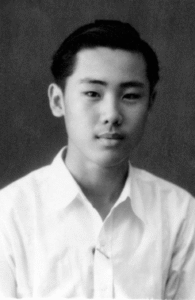Life membership: Wang Gungwu
Lifetime membership award: Wang Gungwu (2014)

In gratitude for his role as a founding member of the Asian Studies Association of Australia (ASAA) in the mid-1970s, and in recognition of his extraordinary contributions to Asian Studies, both in Australia and throughout the region, Professor Wang Gungwu was awarded Honorary Life Membership of the ASAA in 2014.
This was, of course, just one of many honours given to Prof. Wang throughout the lifetime of his scholarly career.
In 2020, for instance, at the age of 90, Prof. Wang was awarded the Tang Prize in Sinology (Tang Prize Foundation, Taiwan). Marking the occasion, Richard Rigby (Emeritus Professor, ANU) referred to him as ‘the leading historian on Sino–Southeast Asian relations’.
In 2022 the National Foundation for Australia–China Relations launched the annual Wang Gungwu Lecture series, which ‘celebrates the substantial and longstanding contributions of Australia’s diverse Chinese communities to Australian life’, in recognition of Professor Wang’s status as ‘the pre-eminent scholar on China and Chinese diaspora communities around the world’. At the launch of the lecture series, Professor Antonia Finnane (University of Melbourne), who completed her PhD at the ANU under Professor Wang’s supervision, said her former mentor is ‘internationally recognised for his contributions, over a period of nearly seventy years, to history, research, and tertiary education in the Asia–Pacific’.
To again quote Richard Rigby, Wang Gungwu’s work ‘draws on the rich personal experience of the various worlds in which he has lived… [his] works display an open, affirming, and positive view of life and learning’. Antonia Finnane’s talk from 2022 refers to some of those worlds: in 1930 Professor Wang was ‘born in the Dutch East Indies of Chinese parents’, but he is also a long-term Singaporean resident of Australian nationality’, who retains ‘a sense of belonging in Malaysia, with roots in Ipoh’. He began his higher education at National Central University (Nanjing, China), before completing a BA and MA in History in Singapore at the University of Malaya, which would later become the National University of Singapore (NUS). Professor Wang completed a PhD at SOAS (University of London), before returning to Singapore in 1959 to teach at his alma mater.
Beginning in 1962, Prof. Wang led first the Faculty of Arts and then the Department of History at the new University of Singapore through a period of volatile and sometimes deadly politics, which was centred around rival conceptions of scholarship, class, race, community, and nationality. He found himself at a pivotal point of this maelstrom when he led an external review of Singapore’s troubled Chinese-language university. He won through by refusing to depart from the principles of scholarly excellence and academic independence for which he is now renowned.
The Australian chapter of his life began in 1968, when Prof. Wang moved to Canberra with his wife, Margaret, and their three children. He served as Head of the Department of Far Eastern History at ANU until 1986, except for five years when he was Director of the Research School of Pacific and Asian Studies (1975–80).
It was during this period that Prof. Wang was instrumental in founding the ASAA, an organisation dedicated to promoting the study of Asia in Australian universities. He served as a Councillor and President in the late 1970s, helping to shape the Association’s direction and influence. Wang Gungwu’s advocacy for Asian Studies was similarly evident in his roles as Chair of the Australia–China Council (1984–86) and in his election as a Fellow and later President of the Australian Academy of the Humanities (1980–83).
In 1986, it was announced that Professor Wang would be leaving the ANU (where he remains Professor Emeritus) and taking up the position of Vice Chancellor of the University of Hong Kong. Antonia Finnane said that ‘we felt it as a huge loss for Asian Studies in Australia. We half-expected him to return’, but instead Wang Gungwu became Director of the East Asian Institute at NUS in Singapore (1997–2007), where he was widely recognised as one of the most senior figures in the scholarship of Chinese and Southeast Asian history, but always seemed to have time to talk to junior scholars.
Australian historian Michael Barr recalls meeting him in 2003: ‘I interviewed Prof. Wang for my PhD thesis on Lee Kuan Yew, and on the strength of this slim connection I arranged to meet him in his office one evening when I was starting a new project on Singapore history. I hoped that he might find half an hour for a chat after work, but he gave me two hours. We finished long after dark and his advice was truly insightful and helpful.’
In the past two decades, Professor Wang’s reputation as one of the world’s most important scholars of East Asia, and especially China, has only been further enhanced. He was one of 10 ‘eminent persons’ to be awarded an Honorary Doctorate from Cambridge University on the occasion of its 800th birthday (2009), and he has been admitted to prestigious academies such as the American Academy of Arts and Sciences and Academia Sinica.
In the country where he holds citizenship, Professor Wang was made an Officer of the Order of Australia (AO) in 2018 for ‘distinguished service to tertiary education as an academic and researcher, particularly to far eastern history and the study of the Chinese diaspora, and to the enhancement of Australia–Asia relations’.
Last but not least, Professor Wang has been honoured with the naming of the one of the ASAA’s most prestigious prizes, for the best article published in Asian Studies Review each year. As the Association looks towards its 50th anniversary in 2026, it is timely to celebrate the life of one of its most remarkable honorary life members.
Special thanks to Antonia Finnane and Michael Barr for their input to this testimonial.
Photo of Wang Gungwu courtesy of his family, as published in Home is Not Here (NUS Press, 2018).
David Hundt
Associate Professor of International Relations, Deakin University
President, ASAA (2025/26)
